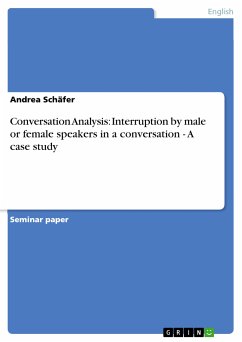Seminar paper from the year 2006 in the subject English Language and Literature Studies - Linguistics, grade: 1,0, University of Freiburg, course: Language Variation and Change, language: English, abstract: Gender roles have always been an important issue in analyzing human behavior. In order to understand the interaction between men and women, it is useful to have a closer look at conversations between male and female speakers and to analyze how they communicate with each other. Some questions that of course occur are whether female speakers talk more than male speakers or if male speakers use more vernacular language, just to name a few examples. Obviously, there is a lot of stereotypical thinking in analyzing gender behavior and many people expect to find some clichés certified. The analysis in this term paper concerns the differences in interrupting by male or female speakers in a conversation. Former conversation analyses tried to demonstrate that in most cases men interrupt women more often than the other way round and that one main reason for this fact is that men always unconsciously try to dominate women and present power. Deborah Tannen examines this claim in her book "You just don't understand: women and men in conversation" (Tannen 1990). While examining the behavior of male and female speakers in conversation she clearly points out that it is not enough to count interruptions in a conversation and to interpret those as an unconscious gender-typical habit, but that it is necessary to pay attention to the factors that caused an interruption and to look beyond the surface in order to understand the events and the development of a conversation. She emphasizes thatn [...] interruption is inescapably a matter of interpretation regarding individuals' rights and obligations. To determine whether a speaker is violating another speaker's rights, you have to know a lot about both speakers and the situation. (Tannen 1990: 190)
Dieser Download kann aus rechtlichen Gründen nur mit Rechnungsadresse in A, B, BG, CY, CZ, D, DK, EW, E, FIN, F, GR, HR, H, IRL, I, LT, L, LR, M, NL, PL, P, R, S, SLO, SK ausgeliefert werden.









